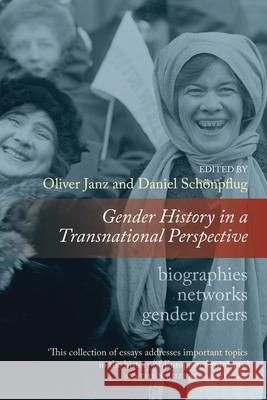Gender History in a Transnational Perspective: Networks, Biographies, Gender Orders » książka
Gender History in a Transnational Perspective: Networks, Biographies, Gender Orders
ISBN-13: 9781782382744 / Angielski / Twarda / 2014 / 296 str.
Recent debates have used the concept of "transnational history" to broaden research on historical subjects that transcend national boundaries and encourage a shift away from official inter-state interactions to institutions, groups, and actors that have been obscured. This approach proves particularly fruitful for the dynamic field of global gender and women's history. By looking at the restless lives and work of women's activists in informal border-crossings, ephemeral NGOs, the lower management of established international organizations, and other global networks, this volume reflects the potential of a new perspective that allows for a more adequate analysis of transnational activities. By pointing out cultural hierarchies, the vicissitudes of translation and re-interpretation, and the ambiguity of intercultural exchange, this volume demonstrates the critical potential of transnational history. It allows us to see the limits of universalist and cosmopolitan claims so dear to many historical actors and historians. Oliver Janz is Professor of Contemporary History at Freie Universitat Berlin and has been Visiting Professor in Berne, Trento and Rome. He is editor-in-chief of 1914-1918-online. International Encyclopedia of the First World War. His recent publications include: Das symbolische Kapital der Trauer. Nation, Religion und Familie im italienischen Gefallenenkult des Ersten Weltkriegs (2009), Dolce Vita? Das Bild der italienischen Migranten in Deutschland (2011) and 14 - Der Groe Krieg (2013). Daniel Schonpflug is Vice Director of the Centre Marc Bloch in Berlin. His publications include Luise von Preuen. Konigin der Herzen (2010) and Die Heiraten der Hohenzollern. Verwandtschaft, Ritual und Politik in Europa 1640-1918 (2013). In recognition of his commitment to Franco-German scholarly exchange, Daniel Schonpflug received the Gay-Lussay-Humboldt-Award in 2010.
Recent debates have used the concept of "transnational history" to broaden research on historical subjects that transcend national boundaries and encourage a shift away from official inter-state interactions to institutions, groups, and actors that have been obscured. This approach proves particularly fruitful for the dynamic field of global gender and womens history. By looking at the restless lives and work of womens activists in informal border-crossings, ephemeral NGOs, the lower management of established international organizations, and other global networks, this volume reflects the potential of a new perspective that allows for a more adequate analysis of transnational activities. By pointing out cultural hierarchies, the vicissitudes of translation and re-interpretation, and the ambiguity of intercultural exchange, this volume demonstrates the critical potential of transnational history. It allows us to see the limits of universalist and cosmopolitan claims so dear to many historical actors and historians.Oliver Janz is Professor of Contemporary History at Freie Universität Berlin and has been Visiting Professor in Berne, Trento and Rome. He is editor-in-chief of 1914-1918-online. International Encyclopedia of the First World War. His recent publications include: Das symbolische Kapital der Trauer. Nation, Religion und Familie im italienischen Gefallenenkult des Ersten Weltkriegs (2009), Dolce Vita? Das Bild der italienischen Migranten in Deutschland (2011) and 14 - Der Große Krieg (2013).Daniel Schönpflug is Vice Director of the Centre Marc Bloch in Berlin. His publications include Luise von Preußen. Königin der Herzen (2010) and Die Heiraten der Hohenzollern. Verwandtschaft, Ritual und Politik in Europa 1640-1918 (2013). In recognition of his commitment to Franco-German scholarly exchange, Daniel Schönpflug received the Gay-Lussay-Humboldt-Award in 2010.











